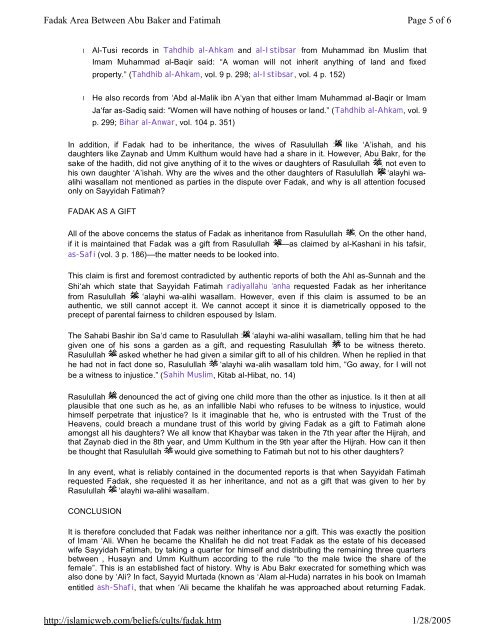Collection Of Articles (Refuting Shia) - Enjoy Islam
Collection Of Articles (Refuting Shia) - Enjoy Islam
Collection Of Articles (Refuting Shia) - Enjoy Islam
You also want an ePaper? Increase the reach of your titles
YUMPU automatically turns print PDFs into web optimized ePapers that Google loves.
Fadak Area Between Abu Baker and Fatimah<br />
Page 5 of 6<br />
• Al-Tusi records in Tahdhib al-Ahkam and al-Istibsar from Muhammad ibn Muslim that<br />
Imam Muhammad al-Baqir said: “A woman will not inherit anything of land and fixed<br />
property.” (Tahdhib al-Ahkam, vol. 9 p. 298; al-Istibsar, vol. 4 p. 152)<br />
• He also records from ‘Abd al-Malik ibn A‘yan that either Imam Muhammad al-Baqir or Imam<br />
Ja‘far as-Sadiq said: “Women will have nothing of houses or land.” (Tahdhib al-Ahkam, vol. 9<br />
p. 299; Bihar al-Anwar, vol. 104 p. 351)<br />
In addition, if Fadak had to be inheritance, the wives of Rasulullah like ‘A’ishah, and his<br />
daughters like Zaynab and Umm Kulthum would have had a share in it. However, Abu Bakr, for the<br />
sake of the hadith, did not give anything of it to the wives or daughters of Rasulullah , not even to<br />
his own daughter ‘A’ishah. Why are the wives and the other daughters of Rasulullah ‘alayhi waalihi<br />
wasallam not mentioned as parties in the dispute over Fadak, and why is all attention focused<br />
only on Sayyidah Fatimah<br />
FADAK AS A GIFT<br />
All of the above concerns the status of Fadak as inheritance from Rasulullah . On the other hand,<br />
if it is maintained that Fadak was a gift from Rasulullah —as claimed by al-Kashani in his tafsir,<br />
as-Safi (vol. 3 p. 186)—the matter needs to be looked into.<br />
This claim is first and foremost contradicted by authentic reports of both the Ahl as-Sunnah and the<br />
Shi‘ah which state that Sayyidah Fatimah radiyallahu ‘anha requested Fadak as her inheritance<br />
from Rasulullah ‘alayhi wa-alihi wasallam. However, even if this claim is assumed to be an<br />
authentic, we still cannot accept it. We cannot accept it since it is diametrically opposed to the<br />
precept of parental fairness to children espoused by <strong>Islam</strong>.<br />
The Sahabi Bashir ibn Sa‘d came to Rasulullah ‘alayhi wa-alihi wasallam, telling him that he had<br />
given one of his sons a garden as a gift, and requesting Rasulullah to be witness thereto.<br />
Rasulullah asked whether he had given a similar gift to all of his children. When he replied in that<br />
he had not in fact done so, Rasulullah ‘alayhi wa-alih wasallam told him, “Go away, for I will not<br />
be a witness to injustice.” (Sahih Muslim, Kitab al-Hibat, no. 14)<br />
Rasulullah denounced the act of giving one child more than the other as injustice. Is it then at all<br />
plausible that one such as he, as an infallible Nabi who refuses to be witness to injustice, would<br />
himself perpetrate that injustice Is it imaginable that he, who is entrusted with the Trust of the<br />
Heavens, could breach a mundane trust of this world by giving Fadak as a gift to Fatimah alone<br />
amongst all his daughters We all know that Khaybar was taken in the 7th year after the Hijrah, and<br />
that Zaynab died in the 8th year, and Umm Kulthum in the 9th year after the Hijrah. How can it then<br />
be thought that Rasulullah would give something to Fatimah but not to his other daughters<br />
In any event, what is reliably contained in the documented reports is that when Sayyidah Fatimah<br />
requested Fadak, she requested it as her inheritance, and not as a gift that was given to her by<br />
Rasulullah ‘alayhi wa-alihi wasallam.<br />
CONCLUSION<br />
It is therefore concluded that Fadak was neither inheritance nor a gift. This was exactly the position<br />
of Imam ‘Ali. When he became the Khalifah he did not treat Fadak as the estate of his deceased<br />
wife Sayyidah Fatimah, by taking a quarter for himself and distributing the remaining three quarters<br />
between , Husayn and Umm Kulthum according to the rule “to the male twice the share of the<br />
female”. This is an established fact of history. Why is Abu Bakr execrated for something which was<br />
also done by ‘Ali In fact, Sayyid Murtada (known as ‘Alam al-Huda) narrates in his book on Imamah<br />
entitled ash-Shafi, that when ‘Ali became the khalifah he was approached about returning Fadak.<br />
http://islamicweb.com/beliefs/cults/fadak.htm<br />
1/28/2005
















